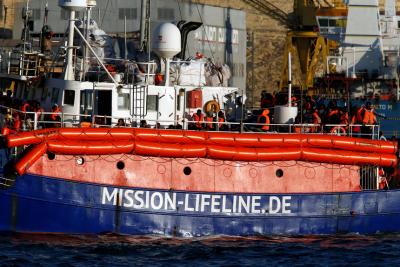Lifeline captain faces charges on rescue vessel registration

ROME – The captain of the Mission Lifeline rescue vessel, which has been detained in Malta, was taken to court on Monday and examined on various charges, primarily relating to improper ship registration, judiciary sources said.
The Lifeline migrant rescue vessel was immediately sequestered upon arrival in Valletta last Friday and the ship’s captain, Claus-Peter Reisch, was directed to police for questioning. A government spokesman confirmed that he would be charged but gave no further details on his sentence.
Both Italy and Malta initially refused the ship docking access, saying that the crew, who had hauled over 200 migrants aboard in Libyan territorial waters, had violated international law.
Lifeline had defied orders from the Libyan Coast Guard to send the migrants back to Tripoli since the decision would have breached the principle of non-refoulement, by which refugees or asylum seekers cannot be returned to a country where they are liable to be subjected to persecution.
Malta, however, eventually granted permission for the ship’s “safe harbour” after an agreement was found to redistribute the migrants on board amongst eight European countries.
Reisch was granted bail against a personal guarantee of 10,000 euros and handed in his passport to authorities. This will restrict him to sleeping on the ship and signing a bail book once a week, with the case expected to resume on July 5.
Today’s trial comes in the wake of a further tragedy in the Mediterranean which saw 63 people go missing on Sunday as the migrant death toll continues to swell, recently surpassing 1000 casualties this year alone.
“Another tragedy at sea,” the UN refugee agency, UNHCR Libya, said. “63 people went missing at sea today when boat capsized. 41 people were rescued by the coast guards in Zwara.
Two days earlier, another migrant ship had sunk whilst transporting over one hundred people, taking the lives of three infants.
The International Organisation for Migration (OIM) has calculated that there are now 20 thousand people stuck in Libyan camps, either saved or blocked by the country’s authorities. These people are “locked up in 20 detention centres in extreme conditions, amongst overcrowded buildings and muggy conditions” whilst temperatures soar above 40 degrees, OIM spokesperson Christine Petrè said.
af


